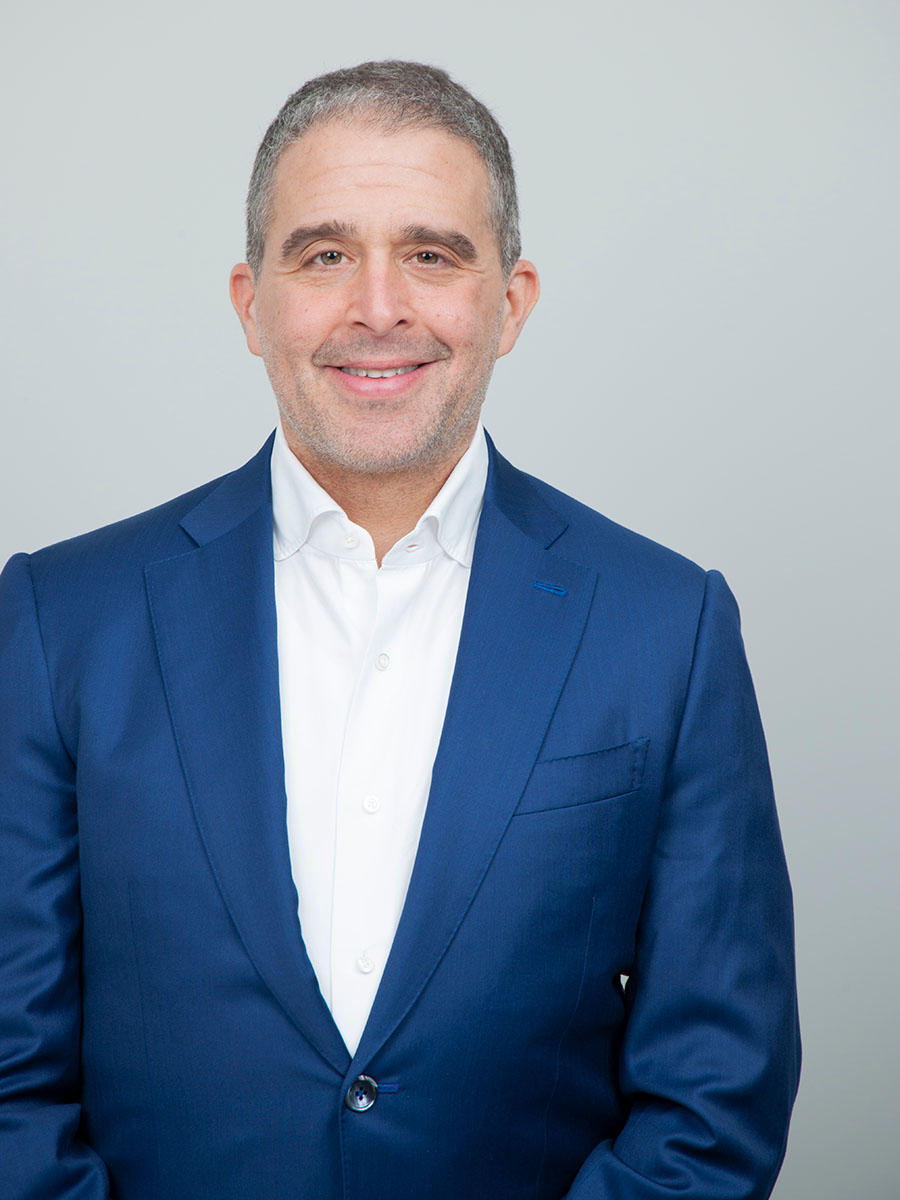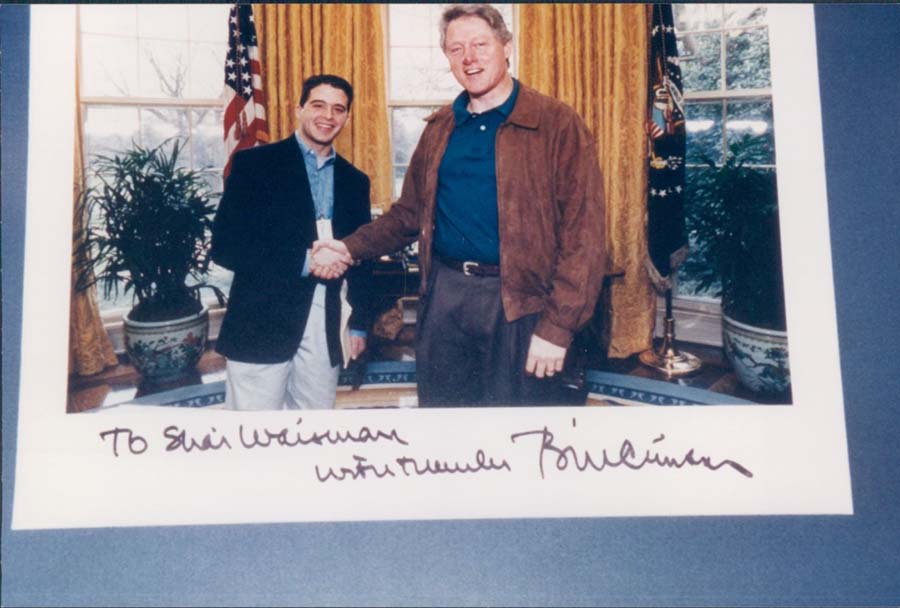View from the Board: CAS Board of Advisors Member Shai Waisman ’93 Shares Life Lessons
 Thirty-six years ago, a stroke of fate and a serendipitous taxi ride guided CAS Advisory Board member Shai Waisman (BA Public Science and Government '93) to American University for the first time.
Thirty-six years ago, a stroke of fate and a serendipitous taxi ride guided CAS Advisory Board member Shai Waisman (BA Public Science and Government '93) to American University for the first time.
Waisman was a senior in high school in New York City when he was invited to visit a cousin for Homecoming Weekend at the University of Maryland. He was a first generation American, the child of immigrants, and this was his first-ever college visit. That Sunday morning, on his way back to DC’s National Airport, Waisman asked his taxi driver if it would be possible to drive past local DC-area universities, knowing that this would likely be his only opportunity to see these (or any) schools. The driver obliged.
As soon as they arrived at American University, Waisman knew it was the school for him. “I took one look and thought this looks cool, it’s suburban but close to all the opportunities in downtown DC, with a beautiful campus,” he says. "This is where I should go to school. I belong here.”
Waisman was a first-generation college student, unsure if he would be accepted at AU—and uncertain about how exactly he would finance his education. But he was determined to find a way, so he called AU for an application and started filling out forms. The following fall, he arrived on campus as a member of American University’s Class of 1993.
An Insightful Approach
This spirit has led Waisman throughout his career. Today, Waisman serves as President of Kroll Inc., a global leader of risk and financial advisory solutions. He has direct oversight of the company’s business units and operational functions, which includes 6,500 employees in over 30 countries.
He joined Kroll in 2019 through the company’s acquisition of Prime Clerk, a portfolio company of The Carlyle Group that Waisman co-founded and where he served as Chairman of the Board and CEO. Previously, Waisman was a Partner in Weil, Gotshal & Manges, where he led some of the largest and most complex restructurings in history, including those of Lehman Brothers, American Airlines, Global Crossing, Loral Space & Communications, Atkins, Silicon Graphics and Steve & Barry’s. At Weil, Gotshal & Manges, he held leadership roles at the firm and on the investment, hiring and technology committees. He holds a JD from the Benjamin N. Cardozo School of Law, where he has served as Vice Chairman of the Board of Advisors for many years.
In 2023, Waisman returned to his alma mater as a member of the College of Arts and Sciences’ Board of Advisors. He joins an engaged group of alumni leaders, parents, and friends who serve as advisors, ambassadors, and philanthropic supporters to advance the mission of the College. Waisman and his fellow board members work directly with College of Arts and Sciences Dean Linda Aldoory on strategy and issues within CAS.
Aldoory says when she first met Waisman, she was brand new to American University, but he was welcoming and generous in sharing his vision for the College. “Shai can make anyone feel comfortable,” she says. “He brings such value to the Board. He holds an insightful approach to how the College should engage with students, connect with alumni, and address the ongoing pressing issues of the day. In a short time period, we've connected frequently, and I've learned a lot from him, which helps gauge my leadership for the College.”
Lifelong Friendships and Life Lessons
As Waisman looks back at his time as a student at American University, he talks about lifelong friendships, professors who took an interest in him, and a series of experiences that helped shape him into the person he is today.
At the end of Waisman’s first year, he realized that his grants and loans would not be enough to fund his education at American University. He began working in a local DC restaurant chain, and he did this throughout his remaining time at AU. It gave him an opportunity to meet all kinds of people, and it taught him important life lessons. “I had to learn to prioritize the things that matter and skip many things that would have been fun that I had no time for,” he says. “It made me way more focused and disciplined as a person.”
Through his jobs and involvement in a myriad of campus activities, Waisman forged strong connections across the AU community. “I made a lot of great friends, including some of my closest friends to this day,” he says. He also met faculty members who took a keen interest in his development. This was important, he adds, especially for a first-generation student who did not have access to professional connections and resources. “I had inspiring professors who took an interest in me beyond the classroom—in countless hours in their offices, on the phone, or on strolls through campus. They mentored me and helped me see my potential and develop my life goals.”
Pinch-Me Moments
Perhaps more than anything else, American University’s location in the nation’s capital offered Waisman opportunities he wouldn’t have found elsewhere. He took full advantage of them. During the fall semester of his senior year, he was offered an internship at the DC Public Defender’s Office. On his first day, he was assigned to the capital murder defense section, handed a file filled with names of witnesses across DC, and told to go out and find them and take statements. “It was eye-opening on many levels, and very formative as I went forward in my career,” he says. The experience expanded his understanding of the human condition and the criminal justice system, and it culminated in him testifying in several murder trials as a key witness for the defense.

The Public Defender’s internship ended around the same time that President Bill Clinton was elected and sworn into office. Waisman started thinking about the possibility of working at the White House. He called the switchboard operator, who connected him with the White House Correspondent’s Office. He was told that the internship program was months away from being formalized, and therefore, no internships were available yet. Undeterred, Waisman said he would call every day to see if anything opened up. And he did.
Finally, one day he got a call back. The White House speechwriting office was understaffed and overworked. They needed help. It wouldn’t be an official internship, and there would be no pay. Plus, he needed to start the following day. Waisman did not hesitate. He said yes, and he worked all semester in the Old Executive Office Building with three presidential speechwriters, immersed in every aspect of supporting their work, including large amounts of time conducting research for the President’s speeches. He even found himself invited to the Saturday morning presidential radio addresses.
“So, every Saturday morning, I was in the Oval Office listening to President Clinton deliver the speech that I helped prepare,” he says. “I always say that my experiences in life, but particularly my time at American University, are my personal Forrest Gump moments—for a first generation American and college student, I just fell into these pinch-me moments.”
A University of Leaders
For Waisman, his return to American University as a board member is a valuable opportunity to contribute his experience and expertise to the College of Arts and Sciences. When he talks about American University now, he focuses on AU’s people and how the university produces generation after generation of leaders.
“The faculty, adjuncts, staff, advisors, and entire student body are pretty unique,” he says. “The school is a gem. It turns out leaders who go on to do amazing things in government, law, social services, business, finance, and more. It is a representation of all that is great in America—a meritocracy where hard work, a good dose of hustle, and lifelong dreams take shape.”
